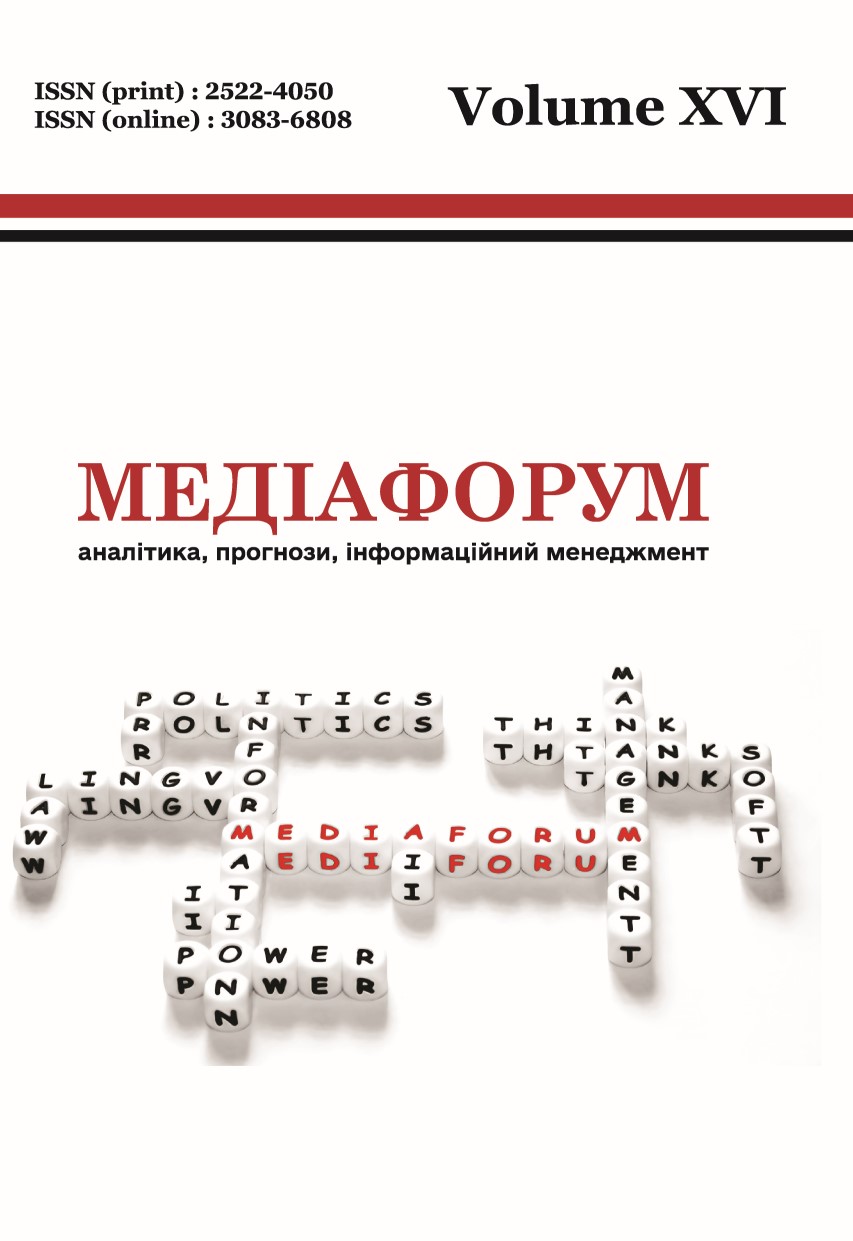Transformation of Ukrainian-Hungarian Relations in the Context of the Russian-Ukrainian War
DOI:
https://doi.org/10.31861/mediaforum.2025.16.240-251Keywords:
Ukrainian-Hungarian relations, Ukraine’s war with Russia, geopolitical situation, Transcarpathian region, energy dependence, Viktor Orbán’s policy, sanctions against the Russian FederationAbstract
The article examines the processes of forming Hungary’s foreign policy interests in the context of the war between Ukraine and Russia, taking into account the historical, political, economic, and cultural traditions of Ukrainian-Hungarian relations. Particular attention is paid to the influence of the geopolitical situation on bilateral relations, Hungary’s dependence on Russian energy resources, and the role of the Hungarian national minority in Transcarpathia. The study analyzes the political strategy of Viktor Orbán’s government, including its balancing act between obligations to the EU and NATO and its pragmatic ties with Russia. In this paper, the author attempts to characterize the impact of official Budapest’s policy on stability in the Central European region and the prospects for cooperation between the two countries.
Downloads
References
1. Babynets, I. (2006). Zakarpattia v systemi mizhderzhavnykh vidnosyn Ukrainy i Uhorskoi Respubliky (1991-2004 rr.). Ukraina – Uhorshchyna: spilne mynule ta sohodennia: materials of the international scientific conference (Kyiv, 14-16 April 2005) / Corresponding editor: V.A. Smolii. Kyiv: Institute of History of Ukraine, NAS of Ukraine, 251-269 (in Ukrainian).
2. Blyzniak, O. (2020). Pozytsii krain Vyshehradskoi hrupy v politytsi YeS shchodo Ukrainy v umovakh rosiisko-ukrainskoi viiny. Modern Historical and Political Issues: Collection of scientific articles. Chernivtsi: Chernivtsi National University, 42, 27-35 (in Ukrainian).
3. Zhovtenko, T. (2018). Vyshehradska chetvirka i Ukraina: evoliutsiia stosunkiv i yikh suchasni bezpekovi vymiry. Demokratychnyi tranzyt v krainakh Vyshehradskoi hrupy ta Ukraini: vybrani aspekty / Edited by D. Shevchuk, V. Lebedyuk. Ostroh: Publishing House of the National University "Ostroh Academy", 190-202 (in Ukrainian).
4. Plokhii, S. (2023). Rosiisko-ukrainska viina: Povernennia istorii (trans. from English by V. Rakulenko). Kyiv: Knyholav (in Ukrainian).
5. Tkach, D. (2006). Osoblyvosti stanovlennia ukrainsko-uhorskykh mizhderzhavnykh vidnosyn. Ukraina – Uhorshchyna: spilne mynule ta sohodennia: Proceedings of the International Scientific Conference (Kyiv, April 14-16, 2005) / Editor-in-chief V.A. Smolii. Kyiv: Institute of History of Ukraine, NAS of Ukraine, 230-238 (in Ukrainian).
6. Tuzhanskyi, D. (2022). Zishtovkhnuty lobamy: yak Rosiia «militaryzuie» etnichne pytannia v Ukraini ta Tsentralnii Yevropi. Legal Bulletin of Ukraine, 6/7, 13 (in Ukrainian).
7. Frantsuz, A.I. (2024). Teoretyko-pravovyi analiz zovnishnikh funktsii Uhorshchyny u realiiakh povnomasshtabnoi viiny Rosii proty Ukrainy: novochasni vyklyky sohodennia. Legal Bulletin, 2(12), 61-64 (in Ukrainian).
8. How neighboring countries are helping Ukraine resist Russian aggression (2024, December 18). https://ua.112.ua/statji/Yak-susidni-krainy-dopomahaiut-Ukraini-protystoiaty-rosiiskii-ahresii-220695.html
9. Aradi, H. (2024). Orbán Viktor: Ukrajnának ütközőzónaként kellene működnie Oroszország és a Nyugat között. Telex. https://telex.hu/kulfold/2024/02/11/orban-viktor-ukrajna-oroszorszag-eu-nato-utkozozona
10. Bayer, L. (2022). Hungary refuses to allow weapons transit to Ukraine. Politico. Retrieved from https://www.politico.eu/article/hungary-foreignminister-peter-szijjarto-weapon-transit-ukraine/
11. Beck, R. (2024, february 23). The Visegrad Four: Disunity in Central Europe. Eurasia Program. https://www.fpri.org/article/2024/02/the-visegrad-four-disunity-in-central-europe/
12. Brader, A. (2023). Orbán: Hungary must stay out of the war. Hungarian Conservative. https://www.hungarianconservative.com/articles/current/orban_hungary_interview_sanctions_war_soros/
13. Cheremisin , M. . (2024). RUSSIAN HYBRID WARS: HUNGARY’S PRO-RUSSIAN POLICY. Collection of Scientific Papers «SCIENTIA», (January 26, 2024; Helsinki, Finland), 121–126. Retrieved from https://previous.scientia.report/index.php/archive/article/view/1574
14. Csernus, D. (2023). Country Report Hungary – Energy Without Russia: The Consequences of the Ukraine war and the EU Sanctions on the Energy Sector in Europe. Budapest: Friedrich-Ebert-Stiftung.
15. Dudlák, T. (2023). Béke minden áron: Oroszország ukrajnai inváziója a magyar kormány diskurzusában. Pólusok, 4(2), 56-79.
16. Éltető, A. & Szemlér, T. (2023). Hungary in the European Union – Cooperation, Peacock Dance and Autocracy. Comparative Southeast European Studies, 71, 3, 272-299. DOI: 10.1515/soeu-2022-0051
17. Gavin, G. (2023). Ukraine accuses Hungary of funding Russian war crimes with energy deals. Politico. https://www.politico.eu/article/hungary-ukraine-russia-gas-deal-urges-eu/
18. Hungarians reject energy sanctions in national consultation. (2023). MTI-Hungary Today. https://hungarytoday.hu/hungarians-reject-energy-sanctions-in-national-consultation/
19. Kopper, A. (2023). Populist Foreign Policy in Central and Eastern Europe: Poland, Hungary and the Shock of the Ukraine Crisis. In P. Giurlando & D.F. Wajner (Eds.), Populist Foreign Policy – Regional Perspectives of Populism in the International Scene. Cham: Springer International Publishing.
20. Kreko, P. (2024). Political tribalism, polarization, and the motivated rejection of science. In J.P. Forgas (Ed.), The Tribal Mind and the Psychology of Collectivism. London: Routledge.
21. Madlovics, B. & Magyar, B. (2023). Kacynski’s Poland and Orbán’s Hungary: Different forms of autocracy with common right-wing frames in the EU. Journal of Right-Wing Studies, 1(1), 1-36.
22. Nemzeti energiastratégia 2030. (2011). Magyar közlöny, 30210-30358. https://njt.hu/document/5d/5df020114130000077_1.pdf
23. Orban imposes new state of emergency in Hungary, saying Ukraine war poses ‘constant danger’. (2022). RadioFreeEurope/RadioLiberty. Retrieved from https://www.rferl.org/a/hungary-orban-state-of-emergency-ukraine-warrussia/31866003.html
24. Orosz, G. & Paskuj, B. (2024). Softly empowering a prosocial expert in the family: lasting effects of a counter-misinformation intervention in an informational autocracy. Scientific Reports, 14(1). https://www.research gate.net/publication/380821819_Softly_empowering_a_prosocial_expert_in_the_family_lasting_effects_of_a_counter-misinformation_intervention_in_an_informat ional_autocracy
25. PM Orbán: Hungary must stay out of conflict. (2022). Hungary Today. https://hungarytoday.hu/orban-ukraine-conflict-hungary-ukrainian-war/
26. Sanctions on Russia must not include ban on Russian energy imports, Hungarian prime minister says. (2022). CNN World. Retrieved from https://edition.cnn.com/europe/live-news/ukraine-russia-putin-news-03-08-22/index.html
27. Sata, R. (2023). Performing crisis to create your enemy: Europe vs. the EU in Hungarian populist discourse. Frontiers in Political Science, 5. https://www.frontiersin.org/journals/political-science/articles/10.3389/fpos.2023.1032470/full
28. Than, K. (2022). Hungary will stay out of Ukraine war, PM Orban tells rally. Reuters. https://www.reuters.com/world/europe/tens-thousands-rally-support-hungarys-orban-election-nears-2022-03-15/
29. Zoltan, A. & Csaba I. (2022). Populism unrestrained: Policy responses of the Orbán regime to the pandemic in 2020–2021. European Policy Analysis, 277-296.
30. Zoltan, S. (2023). How EU is withholding funding to try to rein in Hungary, Poland. The Washington Post. https://www.washingtonpost.com/business/how-eu-is-withholding-funding-to-try-to-rein-in-hungary-poland/2022/12/30/ba3641fc-8818-11ed-b5ac-411280b122ef_story.html/














